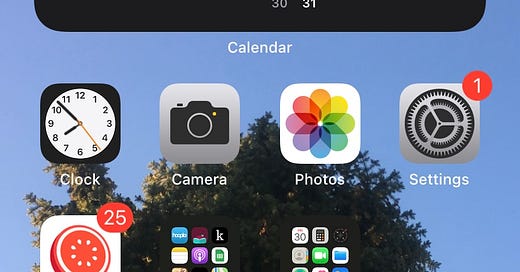Hi there,
How do you fight against a multi-billion dollar attention economy deliberately designed to hijack your attention and time? You treat yourself like a child and use parental control features to opt out: Adulting is not easy.
Five things to share:
Understanding digital tools don’t cause digital addiction is one thing; the attention economy is a whole other beast. There is not enough willpower in the world to successfully steer away from the constant instant gratification and distraction our smartphones provide us. We need aggressive solutions to take back control of our precious time and attention. This is how I turned my iPhone into a dumb phone; a dumb smartphone is soooo boring, but still useful.
I’m currently reading Weapons of Math Destruction by Cathy O’Neil. Big Data is watching. Algorithms have infiltrated all areas of life, from advertising and education to insurance and policing, while remaining opaque, unregulated, and difficult to contest under the guise of objective mathematical facts: They are anything but that. Padded with human subjectivity, assumptions, and biases, algorithms are a “toxic cocktail for democracy” and inequality.
Operation dumb phone is a short video with 12 practical and actionable tips to turn your smartphone into a dumb phone. Instead of getting rid of your smartphone, you can make it a little less smart so you can focus on quality relationships over quantity, connection over content, and creating over consuming. Bonus: It features an adorable tiny baby plotting its escape.
A quote I want to share with you:
How we spend our days is, of course, how we spend our lives.
— Annie DillardNobody ever said, I wish I spent more time on my phone.
Have Smartphones Destroyed a Generation? The arrival of the smartphone has radically transformed every aspect of teenagers’ lives, from their social interactions to their mental well-being. All young people in every corner of the nation and in every type of household feel the havoc social media and smartphones have caused on their lives. Where there are cell towers, there are teens living their lives on their smartphone; dating less, hanging out less, sleeping less, while feeling more and more isolated and lonely.
That’s all for this week!
Thank you for reading, and please share with anyone you think may benefit.
Until next time,
Mehret





yes, boring iphone user reporting in! lol I don't have data plan,never have. I don't/rarely use apps.
I'm spending time offline..walking,being in nature, reading, helping others, when you take the focus off YOU, instead be of service to others, example I am trying to expand beyond me, go pick up 5 pieces of garbage outside. their are actionable things we can do to help others, no more ISM (i self me) there is reason it's call I-phone not WE phone ;) you dig it? ;)
Re. algorithms (disclaimer: I haven't followed through the link yet), we in computer science used to say: "Garbage in, garbage out." Your program could be buggy, your input could be incorrect or even just incomplete, and the output will be in error in either case. (Speaking of incomplete data, the statistical definition of "bias" is pretty much just data that's skewed due to being incomplete.) "Garbage in, garbage out" isn't really especially about computers, however: it also applies to reasoning, and to human processes. Kinda wish it were more widely known outside computing, or even in contemporary computing given that it's more of an oldschool proverb than something kids get taught in code "bootcamps" these days.